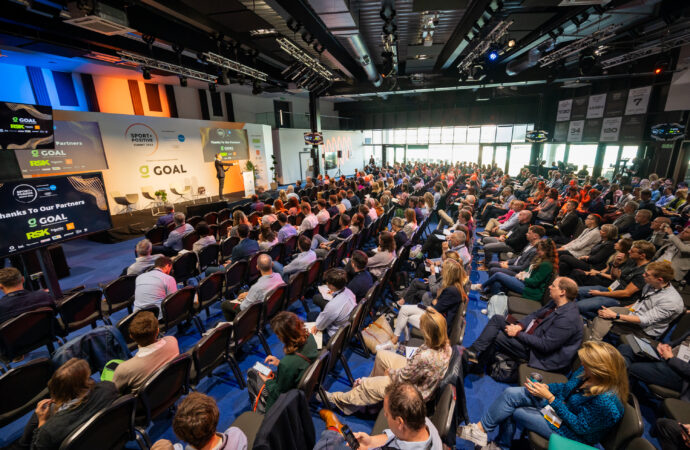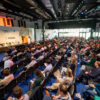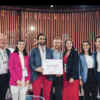In the aftermath of Sport Positive Summit’s latest edition, it’s time to take stock of where we are and where we want to go
“There’s no point in us all being here if we keep avoiding the tough questions,” one attendee at the Sport Positive Summit 2023 told me at The Oval earlier this week.
We agreed that just because there aren’t easy answers, it doesn’t mean we shouldn’t keep trying. If sustainability in sport was easy, the industry wouldn’t be stuck in a thickening fog, that, at times, dims the lantern of hope that carried us to this sector in the first place.
But is that okay? Taking one step at a time through the fog can still ultimately lead us to where we want to go.
That’s why, despite the worsening climate situation we find ourselves in, I’m leaving this year’s Sport Positive Summit with increased belief that the sport industry is reaching a tipping point towards a more optimistic future, and that we have everything we need at our disposal to make it happen.
In almost every conversation I had, I sensed a palpable tension and belief that the industry is ripe for change – but people are frustrated that it hasn’t happened yet. The same buzzwords and phrases like ‘sustainability is a journey’ are still being used. But how much progress along that ‘journey’ has the sector really been making over the last few years?
How can that narrative be flipped on its head? One of my main takeaways from the summit was the degree of interactivity that being together generates. This goes levels beyond merely encouraging collaboration towards exploring the nitty gritty issues and everyday challenges we’re all facing.
Complementing this was a higher level of interaction during the summit’s panel sessions. Participants could submit questions via an app on their phones, and this was seen to best effect in the first ‘annual debate’ at the end of the summit, where audience members could voice their opinions on some of sport sustainability’s most pressing topics.
The debate evidenced another of my takeaways from the summit; people are fed up with fossil fuel sponsorship in sport. Over 80% of audience members in the annual debate agreed that sport should disengage from fossil fuel sponsorship.
A further 80% agreed that sport cannot credibly grow the number of events/competitions, team numbers in tournaments, spectator numbers, more stadiums etc. while being compatible with true environmental sustainability commitments. As the closing keynote of the summit rounded off the event, FIFA announced that the 2030 Men’s World Cup will take place in six countries, exhibiting the disconnect between the stratosphere where the top decision makers are operating from, and where 80% of that room think we should be.
Along with the largest proportion of carbon emissions being produced from burning fossil fuels to travel to sports events, author and teacher David Goldblatt suggested during the annual debate to pause the Olympics until the industry can figure out how to address these problems, raising gasps across the audience.
Rugby league hall of famer Martin Offiah MBE suggested a carbon budget cap for sports, while Sky Sports presenter David Garrido asked panellists how much power athletes could have in ending fossil fuel sponsorship. What if Erling Haaland chose not to play for Manchester City because of the club’s associations with Etihad?
The consensus was that in the extremely unlikely event of this happening, it would be effective, but not enough to generate the necessary level of decarbonisation. Innes FitzGerald, named BBC Sports Green Awards Young Athlete of the Year on Monday after turning down the chance to compete in the World Cross Country Championships in Australia because of the emissions that travelling there would produce, participated in the ‘How Athletes are Engaging Authentically on Climate’ panel. The stir her actions created are undeniably effective in challenging mindsets, but while athletes wanting to voice their opinions on sustainability should be actively enabled and encouraged, responsibility cannot fall on their shoulders to create collective action.
This brings me to my third takeaway from the summit. What’s the point in sustainability if we don’t all go together? Anything but, by definition, is unsustainable. Seán McCabe, climate justice officer at Bohemian FC, argued that buying offsets in third-world countries is a form of green colonialism and fans need to be asked for their input by the teams they support, not dictated to from a pedestal of perfect knowledge.
Jimmy D’Arcy, youth leadership and sustainability manager of the Gaelic Athletic Association, reiterated this sentiment, suggesting we need action raising awareness rather than the far more common vice-versa. We’re social animals and we want to be part of something bigger than ourselves. Claudio Tomasi, resident representative of the United Nations Development Programme (UNDP) in Argentina, as well as Clara D’Onofrio and Lucía de la Vega, president and executive director respectively of the River Plate Fundación, reminded us that there really is no large-scale communal mechanism that transcends modern society like sport.
But to avoid excluding people from a sustainable society, we need awareness of our unconscious biases, as Dr. Jessica Murfree, assistant professor of sport administration at the University of Cincinnati, World Sailing’s head of sustainability Alexandra Rickham and Susie Rodgers MBE discussed in the ‘Imagine Differently: How Environmental Justice Can Start With You’ panel.
Many sustainability ‘solutions’ are inaccessible to swathes of the global population, but why should we be satisfied with that? Why should sporting events exist where the privileged few are flying across the world between events, while local people have limited access?
So, what happens now? Is money really going to be all that talks before the climate crisis stares down the top decision makers with nowhere left to run? Let’s revisit the tipping point I mentioned at the beginning. It seems that too many are convinced that we’re already doing enough to materialise a sustainable and fair utopian future, but the balancing act between utopia and dystopia we’ve been lingering in for years is becoming more perilous.
We really do have spheres of influence to take bold action and make actualising this positive future more likely, and avoid returning next year with a dim sense of limited progress.
What does bold action look like? In the long term, it could end up incorporating new technology and virtual reality, as discussed by The Sustainability Report’s editor Matthew Campelli in ‘The Race to Innovate: How Tech Can Help Us’ panel, allowing us to ‘attend’ events remotely or genuinely experience what people experiencing the brunt of climate change are going through. Or, in the nearer term, it could be restructuring the fabric of our economies into something more grounded, socially and environmentally integrated, as discussed by Seán McCabe and Protect Our Winters UK’s managing director Lauren MacCallum in the ‘Systems Change, Education and Capacity Building’ panel.
Nuanced storytelling that simultaneously steers clear of a defeatist mindset and grounds itself in authenticity can generate the empathy that spurring bold action necessitates. Communicating sustainability in sport in its current context reminds me of an observation I heard in a lifestyle context: ‘Would you do _____ if you couldn’t tell anyone about it?’ I wonder how many of today’s ‘sustainability’ schemes in sport would exist if their primary aim was impact, rather than a marketing tool.
The baseline for sustainability in sport must level up beyond where it is today, and, reflecting on the summit, I believe that across the sector’s organisations, sports and global regions, I’m not the only one who agrees. Let’s find out where this radical spirit can lead us.
Opt into our weekly newsletter for exclusive content focused on sustainability strategy, communication and leadership for sport’s ecosystem.










Leave a Comment
Your email address will not be published. Required fields are marked with *